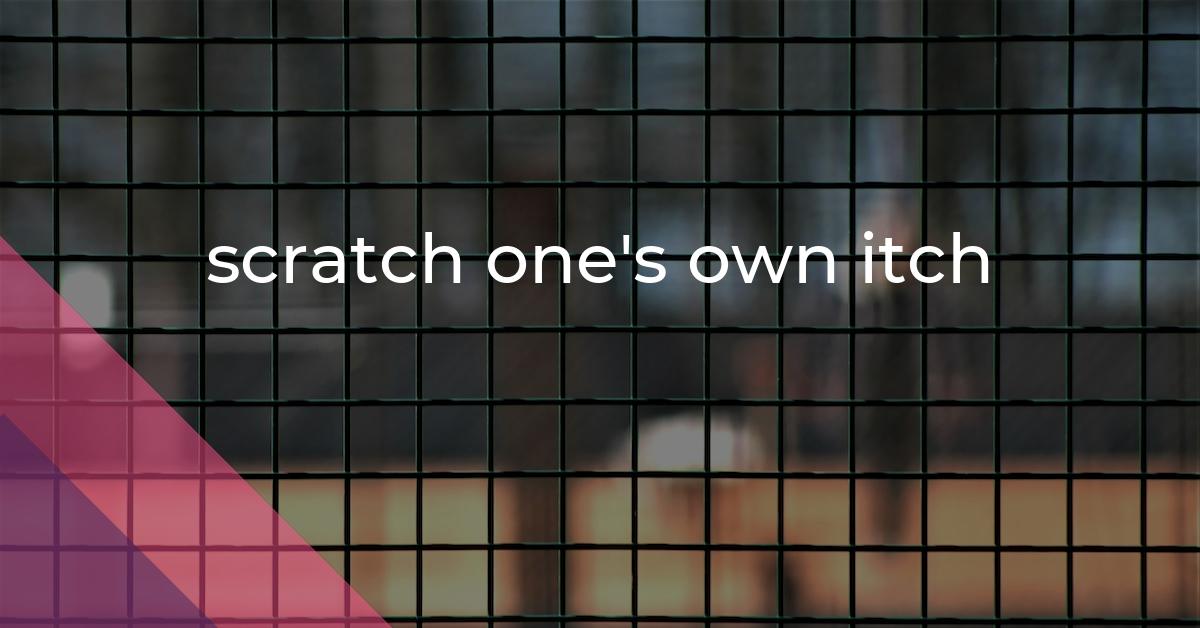scratch one’s own itch: Idiom Meaning and Origin
What does ‘scratch one's own itch’ mean?
The idiom "scratch one's own itch" means to take action to resolve one's own problem or fulfill one's own needs without relying on others for help or assistance.

Idiom Explorer
The idiom "under one's own steam" means to do something without any assistance or support from others.
The idiom "scratch one's head" means to be confused or perplexed about something, often trying to find a solution or understanding. It implies a gesture of scratching one's head as a sign of puzzlement or deep thought.
"Scratch beneath the surface" means to look deeper or investigate further in order to discover the true nature or reality of something. It implies that there is more to a situation or person than what is immediately apparent or visible.
The idiom "scratch an itch" means to alleviate or satisfy a strong desire or need, often by taking action to obtain what is desired.
The idiom "scrape through" means to just barely succeed or pass, often with difficulty or by the smallest margin.
The idiom "scrape along" means to manage to live or survive with little money or resources. It implies a struggle or difficulty in making ends meet.
The idiom "save one's breath" means to not waste one's time and effort in trying to convince or persuade someone who is unlikely to change their opinion or beliefs.
The idiom "salt in the wound" means to worsen an already difficult or painful situation, often by adding insult to injury.
The idiom "rub salt in the wound" means to worsen a difficult situation by adding insult or further distress to someone who is already suffering or upset.
Thrilling Self-Scratching.
The idiom scratch one's own itch means to take care of one's own needs or desires without depending on others. It implies self-reliance and the ability to address personal issues independently. This idiom can apply to various aspects of life, including personal relationships, professional endeavors, and even emotional well-being.
In a personal context, scratch one's own itch suggests that individuals should not depend solely on others for their happiness and should take proactive measures to fulfill their own needs. It encourages individuals to be self-sufficient and to not rely on external sources for their own well-being. This idea is similar to the idiom "scratch an itch," which also implies taking action to address discomfort or irritation.
Similarly, scratch one's own itch applies to professional contexts as well. It conveys the importance of self-motivation and taking initiative rather than expecting constant guidance or assistance from others. This can be related to the idiom "itch the ditch," which conveys the idea of taking action to solve a problem or address a challenge without relying on others.
Emotionally, scratch one's own itch emphasizes the idea of personal autonomy and the empowerment that comes from being able to address one's own desires or challenges without relying on external sources. It encourages individuals to trust in their own abilities and take responsibility for their own lives, similar to the idiom "scratch one's head," which implies thinking critically and finding solutions independently.
It is important to note that while scratch one's own itch promotes self-sufficiency, seeking help or support from others is not always a sign of weakness. There are situations where relying on others can be essential or beneficial, and self-reliance should not be taken to an extreme that excludes the value of collaboration or community. It is important to find a balance between self-reliance and the benefits of reaching out to others when necessary.
Example usage
Examples of how the idiom "scratch one's own itch" can be used in a sentence are:
- When it comes to finding a solution to this problem, you need to scratch your own itch and do the research yourself.
- John decided to start his own business because he wanted to scratch his own itch and create a product he couldn't find on the market.
- Instead of relying on others to fulfill his needs, Mark took matters into his own hands and decided to scratch his own itch.
More "Self" idioms



